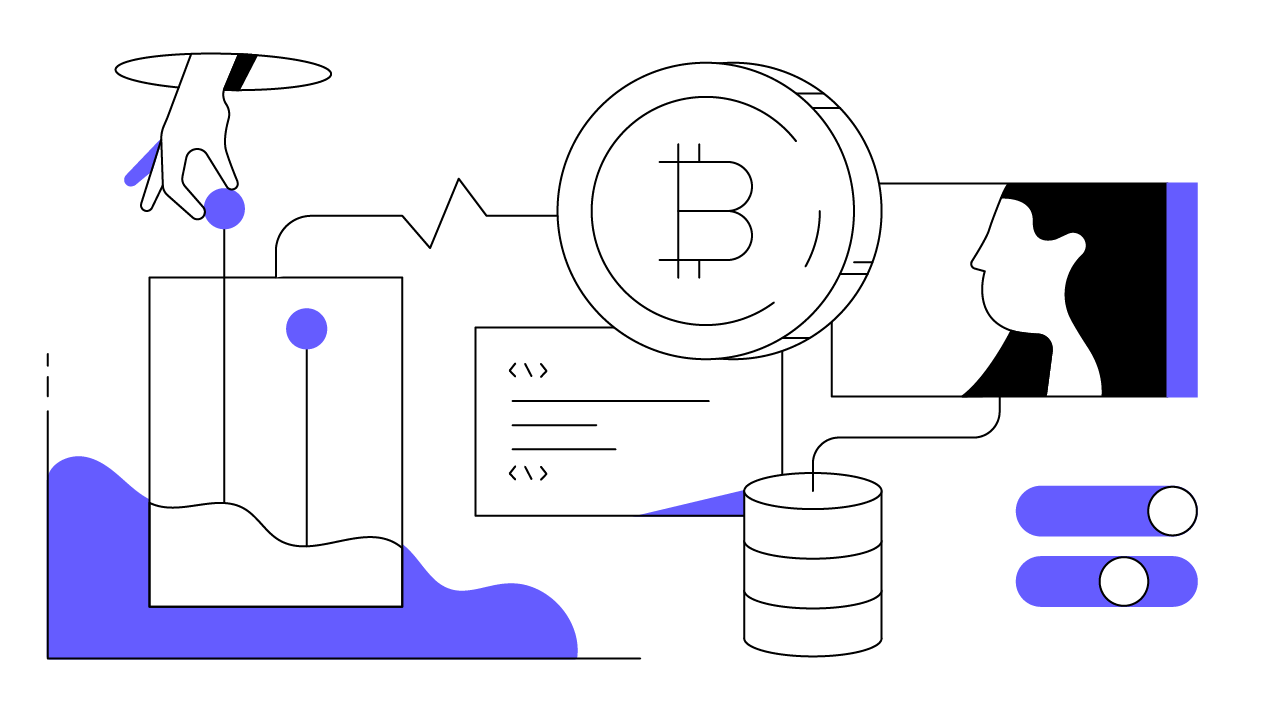Contents
What is Bitcoin?
Understand bitcoin, where and how to use bitcoin, and learn more about blockchain technology.
Updated October 3, 2023 • 5 min read

Summary
Are you crypto-curious? No doubt you’ve heard of bitcoin, but do you really understand what bitcoin is and how it works? With interest in bitcoin and other cryptocurrencies surging, it’s time to take a closer look.
What Is Bitcoin?
Bitcoin is the best known and most popular of the digital currencies—also referred to as cryptocurrencies because of the underlying encryption technology that makes them secure. Digital currencies are a new, electronic form of money developed for the Internet age.
This may come as a surprise, but since its inception in 2009 bitcoin has had such a big impact on the financial world that some commentators have suggested it could become a new world reserve currency and referred to it as “digital gold” or “gold 2.0.” Indeed, many central banks, including the U.S. Federal Reserve, the Bank of England, and the People’s Bank of China, are reportedly exploring the development of their own bitcoin-like cryptocurrencies.
How Can I Use Bitcoin?
Bitcoin can be used as a form of payment in lieu of cash but has features that are lacking in cash. It is also a popular investment vehicle:
Like gold, bitcoins and other cryptocurrencies are scarce resources that can’t be counterfeited or devalued by a government seeking to reduce its debt load. Although, also like gold, speculation and investor demand has made it highly volatile at times. As with gold and other precious metals, investors buy and sell bitcoin on exchanges and directly, buyer to seller.
With a digital asset like bitcoin, it doesn’t require the use of a payment processor, a bank, or a government to transfer value. For large purchases, instead of using a bank as a middleman and paying its fees, you can securely send funds to anyone all over the world, like you would an email.
Because of the technologies used to mint, store and buy them, cryptocurrencies like bitcoin are difficult to hack. But like cash, a transaction involving bitcoin can’t be reversed. Unlike a credit card or certain types of bank transfers, once a bitcoin payment is made it can’t be undone.
Bitcoin Is a ‘Virtual’ Currency
Using publicly available software, bitcoins are created and stored electronically on a computer, which makes them a virtual currency that doesn’t require a physical form like coins or paper money.
What about those coin-like images that you’ve seen in photos? They aren’t really bitcoins. Those visuals were created by newspaper and web site editors who needed to illustrate their articles.¹ So if Bitcoins solely exist as virtual data, what’s to stop someone from duplicating this data and creating more virtual money at will?
Blockchain Technology and Bitcoin
The answer is the record-keeping software that underpins the digital currency. Known as blockchain, this is a type of electronic ledger that runs on multiple computers. No one can alter a blockchain entry on one computer unless the change is acknowledged and agreed to by all the computers in the Bitcoin network. This, along with the encryption used to authorize Bitcoin transfers, makes it impossible for anyone to “mint” more bitcoins on their own.
Bitcoin Is Independent of Central Banks
Because they are independent of governmental entities like the central banks that have traditionally controlled the money supply and the availability of paper currency, bitcoins aren't a direct part of the world's banking system.
Instead, balances are maintained collectively, are associated with addresses, and transfers are approved by the holder using unforgeable mathematics. The fees to trade bitcoin do not scale with the cost or risk of the transfer.
Bitcoin Is in Limited Supply
Like gold and other precious metals, the supply of bitcoins is more-or-less fixed. As of August 2019, there were just shy of 18 million bitcoins in the world, and the total supply can never exceed 21 million, absent a change in the underlying protocol.
But a bitcoin can be subdivided into fractional coins, so its usefulness to pay for things isn’t constrained by limited supply.
The smallest unit of a bitcoin is called a Satoshi, after Satoshi Nakamoto, the supposed inventor of the currency (although nobody really knows for sure if this is a real person or the pseudonym used by a group of people responsible for bitcoin’s creation). A Satoshi is one one-hundred millionth of a bitcoin (0.00000001), which at today’s prices is equivalent to about two one-hundredths of a cent. This implies that participants in the system can own less than a single coin and; in fact, far less than a single coin. This enables commerce and transfers based on smaller notional values.
Where Can I Spend Bitcoins?
When bitcoin was first introduced ten years ago, you couldn’t readily buy anything with it. Today, while you generally still can’t take the bus or pay for a meal at a local restaurant using bitcoin, there’s a growing list of companies that accept it as a form of payment—especially via their web sites.
These include such well-known brands as:
- The online retailer Overstock.com
- The electronics retailer Newegg
- The travel and hotel booking agencies CheapAir and Expedia
- The OKCupid dating site
- And Microsoft, which allows customers to use bitcoin to pay for purchases at its Windows and Xbox stores
Other merchants that accept some types of bitcoin payments include Dunkin Donuts, Best Buy, Home Depot and Target.² Many retailers are tapping into Flexa, a global cryptocurrency payments network that makes it easier for consumers to use bitcoins at their stores.³
Investing in Bitcoins
Up to now, the primary interest in bitcoin has not been for making payments; worldwide interest has been focused on the cryptocurrency’s investment potential.
Bitcoins are traded on various exchanges under the ticker BTC or XBT. In 2011, the price started at $0.30 per bitcoin, rising to a high of $5.27 for the year. In 2012, the price rose to a high of $13.30 and then peaked at $770 the following year.⁴ The digital currency hit an all-time high of $20,089.00 on December 17, 2017.⁵
Bitcoin prices have historically fluctuated, and have generally fallen since the peak at the end of 2017, falling to $6,914 on February 5, 2018, when the Chinese government banned bitcoin trading. As of this writing, prices hovered between $8,200 and $9,500 in November 2019.⁶
If you’re considering an investment in bitcoin, it’s also worth keeping in mind that In 2014, the IRS ruled that all virtual currencies, including bitcoins, would be taxed as property rather than currency. This complicates your tax calculation if you use bitcoin to buy something, because your bitcoin “property” may have risen or fallen in value between the time you obtained it and used it as payment—and the IRS will want to know!⁷
The Bottom Line
Everyone needs to assess their own risk tolerance when it comes to investing, including in cryptocurrency like bitcoin. Cryptocurrencies are still a budding space, and their popularity is likely to grow as an alternative form of money.
This content is for general informational purposes only and is not investment, tax or legal advice. Past performance may not be indicative of future results. You should consult your own appropriately qualified and licensed tax, legal, investment and/or accounting advisors before engaging in any transaction.
-------------
¹ “What Is Bitcoin and How Does It work?” The New York Times, [https://www.nytimes.com/2017/10/01/technology/what-is-bitcoin-price.html](https://www.nytimes.com/2017/10/01/technology/what-is-bitcoin-price.html)
² “How to Use Bitcoin for Purchases,” thestreet, [https://www.thestreet.com/investing/bitcoin/what-can-you-buy-with-bitcoin-14556706](https://www.thestreet.com/investing/bitcoin/what-can-you-buy-with-bitcoin-14556706)
³ ‘Flexa and Gemini Partner to Make It Easy to Use Cryptocurrency,’ Gemini, https://medium.com/gemini/flexa-and-gemini-partner-to-make-it-easy-to-use-cryptocurrency-b9ace9174bcc
⁴ “Bitcoin,” Wikipedia, [https://en.wikipedia.org/wiki/Bitcoin#Creation](https://en.wikipedia.org/wiki/Bitcoin#Creation)
⁵ “Bitcoin,” CoinMarketCap, [https://coinmarketcap.com/currencies/bitcoin/historical-data/](https://coinmarketcap.com/currencies/bitcoin/historical-data/)
⁶ Ibid
⁷ “Bitcoin,” Investopedia, [https://www.investopedia.com/terms/b/bitcoin.asp](https://www.investopedia.com/terms/b/bitcoin.asp)
Cryptopedia does not guarantee the reliability of the Site content and shall not be held liable for any errors, omissions, or inaccuracies. The opinions and views expressed in any Cryptopedia article are solely those of the author(s) and do not reflect the opinions of Gemini or its management. The information provided on the Site is for informational purposes only, and it does not constitute an endorsement of any of the products and services discussed or investment, financial, or trading advice. A qualified professional should be consulted prior to making financial decisions. Please visit our Cryptopedia Site Policy to learn more.

Is this article helpful?


